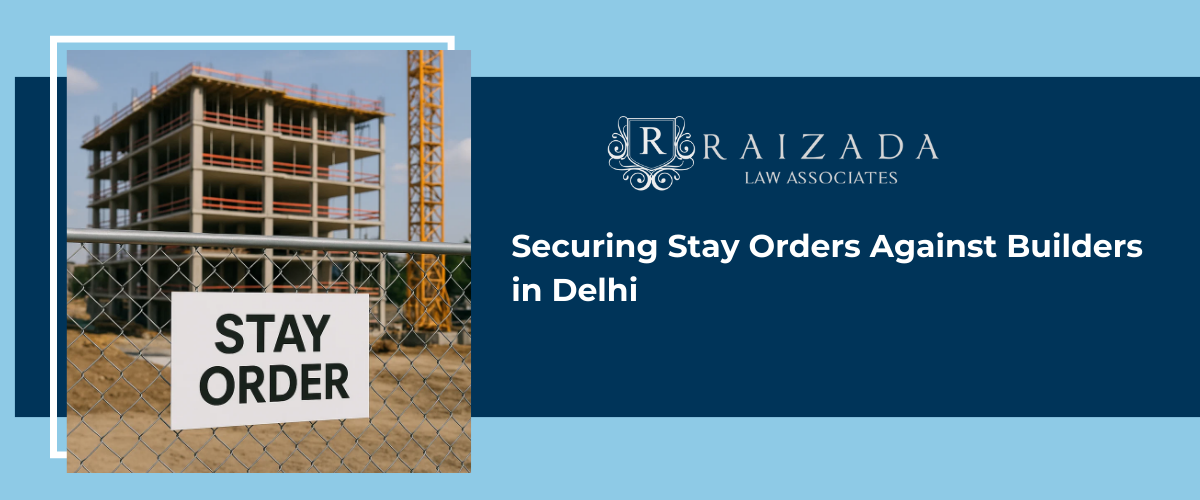Homebuyers in Delhi often find themselves entangled in disputes with builders over issues like delayed possession, non-compliance with agreements, or unauthorized construction. In such scenarios, obtaining a stay order becomes crucial to halt any adverse actions by the builder and protect the buyer’s interests.
Understanding the Legal Framework
RERA (Real Estate (Regulation and Development) Act, 2016)
RERA was established to promote transparency, accountability, and efficiency in the real estate sector. Homebuyers can file complaints under Section 31 of RERA against builders for issues like delayed possession or non-compliance with project specifications. RERA has the authority to issue interim orders to protect the interests of homebuyers. However, its jurisdiction is limited to matters within the real estate domain.
Civil Suits
For issues beyond the purview of RERA, such as breach of contract or property disputes, homebuyers can approach civil courts. Under the Civil Procedure Code (CPC), particularly Order XXXIX, a party can seek an interim injunction or stay order to prevent the other party from taking certain actions that could cause irreparable harm.
Overlap Between RERA and Civil Suits
While RERA addresses real estate-specific issues, civil courts have broader jurisdiction. In cases where RERA cannot provide adequate relief, homebuyers can file civil suits. Notably, the Saket District Court in Delhi has held that if RERA cannot provide relief, a civil suit is maintainable, emphasizing that the jurisdiction of civil courts is not barred by RERA in such cases.
Procedure to Obtain a Stay Order
1. Engage a Competent Property Lawyer
Retaining an experienced civil lawyer in Delhi is the first step. A seasoned lawyer will assess the merits of the case, determine the appropriate forum (RERA or civil court), and prepare the necessary documentation.
2. Draft the Suit/Petition with Stay Application
The lawyer will draft a civil suit or a petition, including an application for an interim stay. This application must demonstrate a prima facie case, urgency, and the possibility of irreparable harm if the stay is not granted.
3. File the Application
The application is filed in the appropriate court or tribunal. For real estate matters, this could be RERA or a civil court. In Delhi, civil suits are typically filed in District Courts, such as Saket, Tis Hazari, or Patiala House.
4. Mentioning the Matter for Urgent Hearing
In cases of urgency, the lawyer can “mention” the matter before the Registrar or Duty Bench, requesting an expedited hearing. Delhi courts accept online mentioning requests via their respective portals.
5. Court Hearing and Interim Relief
During the hearing, the judge will consider the merits of the application. If satisfied, the court may grant an interim stay order, temporarily halting the builder’s actions until the final adjudication.
6. Compliance and Filing Requirements
After the stay order is granted, the applicant must comply with any filing requirements, such as serving notice to the builder and submitting necessary documents.
Practical Timelines
- RERA Proceedings: RERA is mandated to dispose of appeals within 60 days from the date of receipt, though this period may be extended for reasons recorded in writing.
- Civil Suits: The timeline for obtaining a stay order in civil suits can vary. In urgent cases, interim relief may be granted on the same day of filing, subject to the judge’s discretion and docket availability.
FAQs on Stay Orders Against Builders in Delhi
1. What is a stay order against a builder?
A stay order is an interim legal relief issued by a court or tribunal to temporarily halt certain actions of a builder, such as construction, possession delivery, or transfer of property rights, until the final decision in the dispute is made.
2. Can I approach both RERA and civil courts for a stay order?
Yes. RERA deals specifically with real estate matters like delayed possession or deviations from approved plans. Civil courts handle broader issues such as contractual breaches or property disputes. If RERA cannot provide adequate relief, civil courts can grant a stay order.
3. How long does it take to get a stay order in Delhi?
Timelines vary: RERA appeals are generally disposed of within 60 days, though extensions are possible. Civil courts may grant interim relief within days in urgent cases, but a typical timeframe depends on case complexity and court workload.
4. What is required to file for a stay order against a builder?
You need a prima facie case, proof of urgency, and evidence of irreparable harm if the builder’s actions continue. A competent lawyer will draft the suit or petition and an application for interim relief, then file it in the appropriate court or tribunal.
5. Can a stay order stop illegal construction by a builder immediately?
Yes, if the court is convinced of urgency and potential harm, it can issue an interim stay order, halting the construction or other disputed actions temporarily until the final decision is reached.
Conclusion
Securing a stay order against a builder in Delhi involves navigating a complex legal landscape, balancing the provisions of RERA with the broader jurisdiction of civil courts. By understanding the interplay between these legal avenues and following the prescribed procedures, homebuyers can effectively protect their rights and interests. Engaging a competent property lawyer and acting promptly are crucial steps in ensuring timely and effective legal relief.




